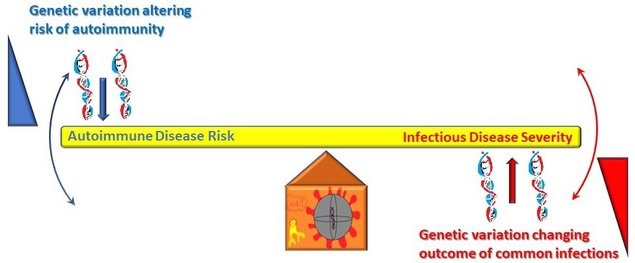Some genetic polymorphisms might expose individuals to the risk of autoimmune diseases while also protecting them against the effects of viral infection. A study published on November 3rd, 2022, in the open-access journal PLOS Genetics by David Morris and Timothy Vyse of King’s College London, UK, and coworkers reveals that a genetic predisposition for systemic lupus erythematosus (SLE) could be beneficial against severe COVID-19 infection.
 The balance between the risk of autoimmune disease and the risk of infection. Image Credit: Dr David Lester Morris, Robert Lester Morris, Dr Deborah Cunninghame Graham, and Professor Timothy Vyse.
The balance between the risk of autoimmune disease and the risk of infection. Image Credit: Dr David Lester Morris, Robert Lester Morris, Dr Deborah Cunninghame Graham, and Professor Timothy Vyse.
Researchers discovered a link between the genes related to severe COVID-19 and those associated with SLE. Researchers compared the genetics of severe COVID-19 with those of SLE utilizing different methods, including one that can concentrate on specific regions of the genome, to find related genes and obtain insights into the shared genetic effects.
To comprehend the biology of common genetics, the investigators reviewed data on genes and genome structure gathered from different biological sources.
The scientists determined that TYK2, a gene linked to both SLE and severe COVID-19, protects against viral infection but raises the likelihood of autoimmune disease. Future research will be required to completely understand the genetic connections between COVID-19 and other diseases. There are certain limitations to the study, like the overrepresentation of European ancestry in the datasets utilized to conduct the analysis.
“Our results indicate that there are shared genetic effects between the autoimmune disease SLE and the clinical consequences of COVID-19. The locus with the most evidence of shared association (TYK2) is involved in interferon production, a process that is important in response to viral infection and known to be dysregulated in SLE patients. In seeking to uncover the mechanisms underlying these relationships it was apparent that the functional effects of the risk and protective genotypes are complex,” the researchers added.
“This is an exciting result made possible by the large genetic studies in COVID-19 and Lupus, and opens the door to our understanding of how the biology of the immune system is calibrated to protect us against infection from viruses and other infectious agents, but at the risk of developing autoimmune disease,” concludes Dr David Morris and Professor Timothy Vyse, who headed the study.
Source:
Journal reference:
Wang, Y., et al. (2022) COVID-19 and systemic lupus erythematosus genetics: A balance between autoimmune disease risk and protection against infection. PLoS Genetics. doi.org/10.1371/journal.pgen.1010253.